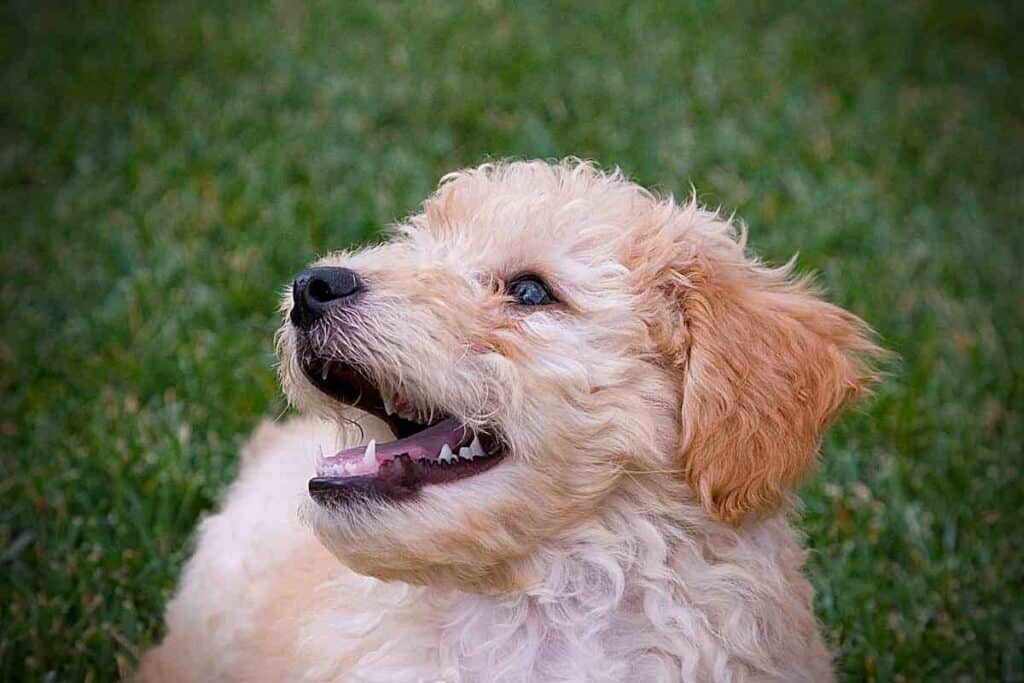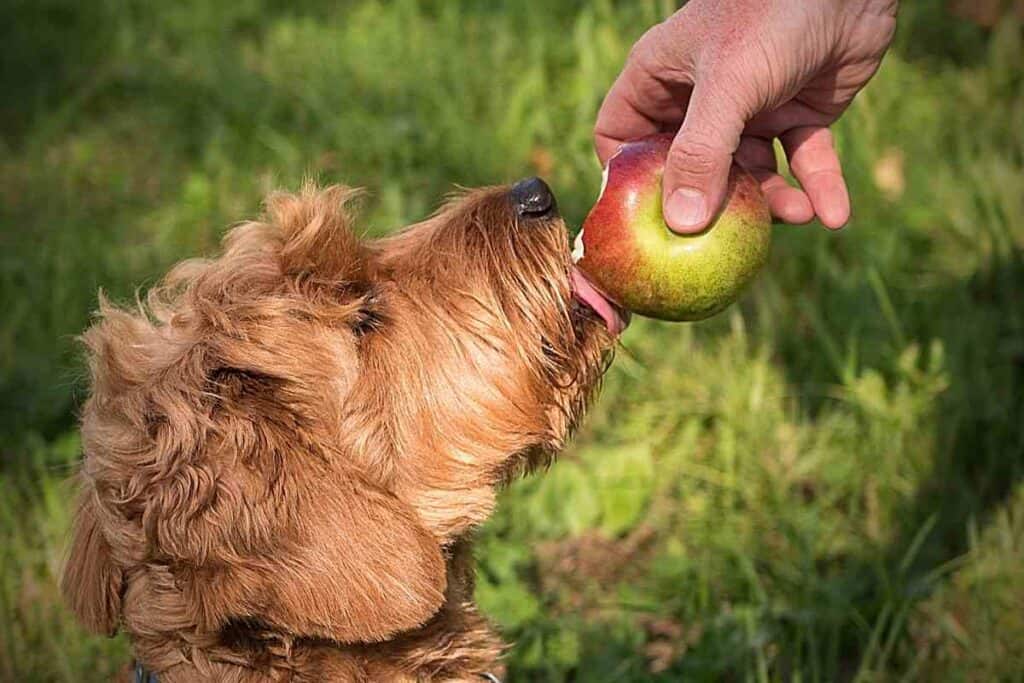How Long Is A Dog Considered A Puppy?
Not long ago, we welcomed our fur baby Lexie into the fold of our family. After our dog Buddy’s passing, we eventually decided to welcome another dog into our home and hearts. We have had Lexie now for five years, and we couldn’t be happier. When we first welcomed her home, she was a puppy. We walked through every stage of her development, from puppy to adulthood. We didn’t know much about each step of her development during puppyhood, but with time, patience, and a lot of investigating, we learned. Some moments were joyous, others, not so much. There were even a few moments where we thought we would never leave the puppy stage.
Below we share what we know about raising a mini Goldendoodle puppy from one stage to the next until adulthood. We hope this is helpful and a resource other people can turn to when they need information.
How Long Is A Dog Considered A Puppy?
How long is a dog considered a puppy? A dog is regarded as a puppy for approximately the first two years of life. Growth is determined by their breed and family background.
Individual dogs in each breed can also develop differently; therefore, this is just a guide.
Puppies go through multiple development stages from birth to adulthood, each dog maturing just a little differently than the other. A dog is considered a puppy until they have reached their full maturity physically and when they have entirely developed sexually.
Some smaller puppies will finish the puppy stage sooner than their larger breed companions. The multiple steps that a puppy goes through have their unique milestones. These can include physical development of various body parts, including teeth, eyesight, and so forth.
Every stage of a dog’s life is memorable. There are moments where they make us laugh, scream, cry, and wonder how we ever existed without them. Understanding the stages of puppyhood helps us better prepare for what lies ahead.
For approximately the first two years of life, any breed dog will grow from puppy to adult. When they reach adulthood can be hard to determine because each breed is special, and each dog in that breed is individually different from another. Some factors can enhance or hinder a dog’s development and growth through the puppy stages.
Smaller dogs, such as our mini Goldendoodle Lexie, will complete the growth cycle from puppy to adult faster than another larger dog. It takes their bodies a smaller amount of time to develop to full physical maturity.
What are the growth cycles of puppyhood?
There are multiple stages of growth in puppyhood. These cycles each have their special milestones and developmental markers.
The first growth cycle lasts from the moment they are born until they are three weeks old. This cycle of development is comfortable with their mother taking care of their needs.
Sleep and mother’s milk are vital to their healthy growth. Their sense of sight and hearing and their teeth will gradually develop during this time. When they reach the end of this stage, puppies become aware of the world around them.
The next growth cycle goes from the end of the first cycle to around week seven. At this time, social and physical growth is vital for interacting with mother, littermates, and humans in their family.
This early socialization passively teaches them what others will tolerate, including their mother and littermates, while they also learn to play.

By the time they are at the end of this growth period, they eat puppy food, run around, and wag their cute tails. Mothers will begin the weaning process, and during this time, they will also receive vaccinations before they are ready for adoption.
Following this period, they begin the next that continues until they are twelve weeks old. This period is the time when a puppy can usually be adopted. Having a good quality, nutrient-dense puppy food recommended by their veterinarian will ensure their continued healthy growth. This food should contain the right amount of protein.
Since puppies of this age group are very receptive to everything, it is an excellent time to begin active socializing. Puppy classes and playdates with other dogs and humans provide a mixed variety of social interactions, which are the foundation of a well-behaved puppy.
Socialization and exposure to a wide variety of life experiences can help with any fears that typically arise during this stage. This exposure should be done gradually so they don’t get overstimulated. Patience and a casual attitude about the puppy’s fear at this time can lessen their anxiety as they learn that they don’t need to be afraid.
After this, the three to the four-month-old stage can be a bit more challenging for their loving human family. While they become independent on many levels, they will teethe, bite, and chew because of their painful and sensitive gums.
With the right mindset and some handy chew toys, this is easily managed.
This stage is the perfect time to start obedience training, whether with a trainer or at home, to ensure that the puppy grows up to be a well-behaved and friendly dog. Training is a lifelong process of learning and reviewing.
They will continue to grow and challenge their loving family at the four to the ten-month growth cycle. Patience combined with persistence and continued socializing and training will win the day. Biting shouldn’t be allowed at this stage, so the puppy understands that aggressiveness and dominant behaviors are unacceptable.
While all this is going on, it is good to spay or neuter them to keep them healthy.
The next cycle from ten months to a year is when smaller dog breeds or dogs will reach their full growth potential.
During this time, exercise them a lot to prevent unsavory behaviors while reinforcing positive behaviors. The puppy/adult dog will continue to test their and their family’s limits, but their family will succeed through continued training and socializing.
The final stage of development for a puppy before turning into an adult dog (unless they are a tiny dog) is from one year to two years. They are fully grown at this stage. This completes the cycle of growth from puppy to adult for any dog breed, and they can now be exercised more regularly and taken on hikes or other adventures.
Their bones, joints, and muscles are developed, which lessens the chance of injuries like they could have experienced during the puppy stage.
Puppy and the human family have made it through some challenges and learned a lot. We did with Lexie!
What are some tips for keeping my puppy healthy as they grow to adulthood?
One of the most important things we found out as new puppy parents were diet is incredibly important. With all the growing a puppy does in the first year or two, they need lots of nutrient-dense food. We consulted with Lexie’s veterinarian whenever we felt unsure of something.
Some other tips for ensuring a healthy pup through every cycle of growth is making sure they see the veterinarian. They should also be vaccinated and receive some form of socializing and obedience training.
If these critical areas are attended to, and the puppy is shown plenty of love and affection, they will thrive and grow healthy. A healthy, happy home environment is what every puppy needs.
Can I change a dog’s diet during puppyhood?
No, the puppy’s diet should not be modified or changed unless their veterinarian directs. Changes to the type of food a dog gets, puppy or adult can upset their gastrointestinal tract. If the food is healthy and nutritious, there should be no need to change their diet during this stage.
Puppies require lots of food as they go from one growth stage to the next. Increases in the amount of food they consume will happen, but the food should remain the same.
If their veterinarian recommends changing their diet for some reason, they can instruct new puppy owners on how best to get it done right. The right steps for switching food give a puppy’s digestive tract time to adjust because the process is done slowly.

Is there anything that affects a dog’s growth during the puppy stages?
Yes, many things affect their growth during the puppy stages.
- Genetics
- Diet
- Health
- Exercise
- Environment
These top factors can affect a puppy’s growth negatively or positively? A healthy lifestyle prevents any issues from arising.
In Conclusion
While we stated that each breed and dog are unique, a puppy is fully grown into adulthood when they are between one and two years old. Larger breeds will take longer to reach this milestone, while smaller breeds and dogs will arrive there faster.
No chart or recipe can gauge precisely when a dog will reach adulthood, but guidelines can be given. Whatever the time frame for an individual puppy to grow is, the journey is sure to be fun!
Sit back, take lots of pictures, and hide those shoes because of puppies’ rule!
